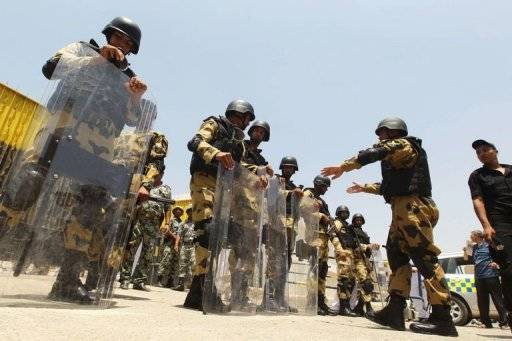With the country's post-revolutionary politics in turmoil, Egyptians have finished the first day of voting of a presidential runoff which pits the Muslim Brotherhood's candidate against the last prime minister under deposed president Hosni Mubarak.
Turnout was mixed throughout the day on Saturday, with reports of long lines at some polling stations.
One monitoring group, the Egyptian Alliance for Election Monitoring, said the crowds were larger than those during the first round of voting in May.
Polls closed at 9pm local time (1900 GMT) after being extended for one hour. They will be open again on Sunday. There was a heavy police and army presence at many polling stations, witnesses said.
Both candidates turned out early to cast their own votes. Mohammed Morsi, the Muslim Brotherhood's candidate, voted in Zagazig, the Nile Delta city where he spent decades teaching.
Ahmed Shafiq, a former air force commander, voted in the Cairo suburb of Tagammu al-Khamis.
Journalists at his polling station said he slipped in through a back door amidst heavy security.
'Revolution would have been pointless'
Shafiq and Morsi both received about 25 per cent of the vote in the first round, and it is hard to predict how either will fare in the runoff.
Of the three prominent defeated candidates, only one of them, Abdel Moneim Aboul Fotouh, has made an endorsement, backing Morsi.
Al Jazeera's Sherine Tadros, who visited polling stations in several Cairo neighborhoods, tweeted that voters there overwhelmingly backed Shafiq.
He trailed Morsi in Cairo in the first round, though it was Hamdeen Sabbahi, the Nasserist candidate, who came top with roughly one-third of the city's votes.
In the northern city of Alexandria, which also went for Sabbahi, one young voter told Al Jazeera that she could not vote for a representative of the old regime.
"I want a president that can fix the educational system," said Suhaila Nassar.
"It should be provided for me here, as a citizen. I voted for Mohammed Morsi because he is not from the old regime.
"If I had voted for someone from the old regime, then the revolution would have been pointless."
'Anti-regime states'
In Damanhour, a town of about 240,000 people in the heart of the agricultural Nile Delta, turnout appeared to be low throughout the morning and midday.
A steady flow of voters filed into polling stations in the Selim el-Bishri neighborhood, but no queues were apparent.
Damanhour is the seat of the Beheira governorate, where Morsi took first place in the first round. The governorate has a strong Islamist presence, and Shafiq came in fifth there.
Hosni Omar, a civil engineer and Muslim Brotherhood member who was observing polling stations for the Morsi campaign, said the Brotherhood estimated turnout in the Damanhour area had only reached 10 per cent by noon.
Omar told Al Jazeera's Evan Hill that the campaign had reported voting violations in various governorates, but none that amounted to widespread fraud or vote rigging.
Their colleagues in Alexandria had reported seeing a riot police truck carrying men in civilian clothes, but there was no proof they were transporting police to vote illegally, as many have worried might happen since the first round.
Omar said he was concerned that "thugs" paid by figures from the former regime, whom he said now support Shafiq, would try to pull the Brotherhood and its supporters into fights if they did not see the vote going for Shafiq.
But he still predicted a "record" victory for Morsi. "Beheira has always been one of those anti-regime states," he said.
A smooth process
Judges overseeing the vote in the area described a smooth and uneventful process. In polling places, Al Jazeera witnessed them checking IDs and enforcing confidentiality. Some said they had received supplementary lists of names to be struck from the voter rolls on Friday, but only in small numbers.
Police and armed navy troops secured the polling stations, but in some cases soldiers entered the polling rooms, in violation of electoral laws. In the Haditha General Preparatory School for Girls, one soldier in uniform filmed voters and journalists, while another in fatigues and wearing a military intelligence t-shirt stood in the doorway.
Political uncertainty
Egyptian expatriates voted earlier this month, and overwhelmingly backed Morsi, who received more than 222,000 votes to Shafiq's 75,000, according to preliminary results.
But their votes may not be representative of the broader population; Shafiq, for example, received less than 10 per cent of the overseas vote during the first round.
Regardless of who wins, the next president will take office without a clear mandate or an elected legislature.
The Supreme Council of the Armed Forces (SCAF), Egypt's military rulers, moved to formally dissolve the lower house of parliament on Friday, following a ruling by the high court which found the legislature ‘unconstitutional’.
The court ruled that part of the electoral process, which allowed political parties to compete against independent candidates for certain seats, was unconstitutional.
SCAF announced on Thursday that it would assume lawmaking powers after parliament's dissolution.
On Friday, the generals said they would manage the budget as well, according to the state-run Al-Ahram newspaper.
Earlier this week, the justice ministry issued a decree allowing the military to arrest civilians for a range of crimes, further empowering the military and raising comparisons with the country's recently scrapped emergency law.
"I think that in the coming days, weeks, SCAF will issue what we call a supplementary constitutional declaration by which it will try to further specify the powers of the new president," said Mazen Hassan, a legal scholar at Cairo University.
PHOTO CAPTION
Egyptian special forces stand guard outside a polling station in Cairo.
Al-Jazeera


 Home
Home Discover Islam
Discover Islam Quran Recitations
Quran Recitations Lectures
Lectures
 Fatwa
Fatwa Articles
Articles Fiqh
Fiqh E-Books
E-Books Boys & Girls
Boys & Girls  Hajj Rulings
Hajj Rulings Hajj Fatwas
Hajj Fatwas














